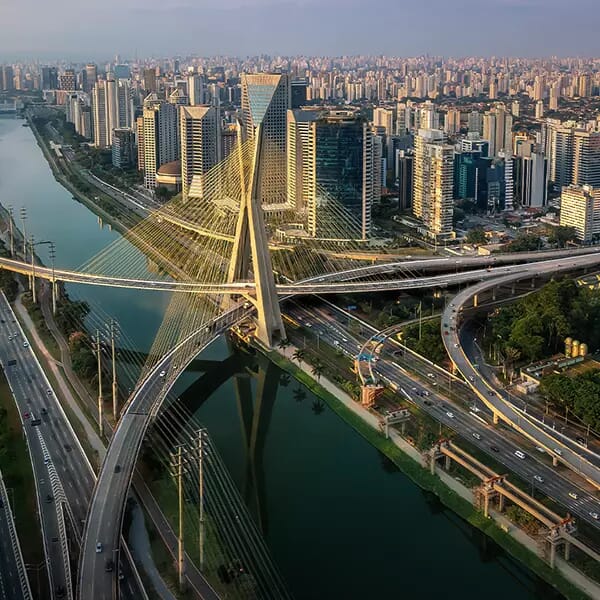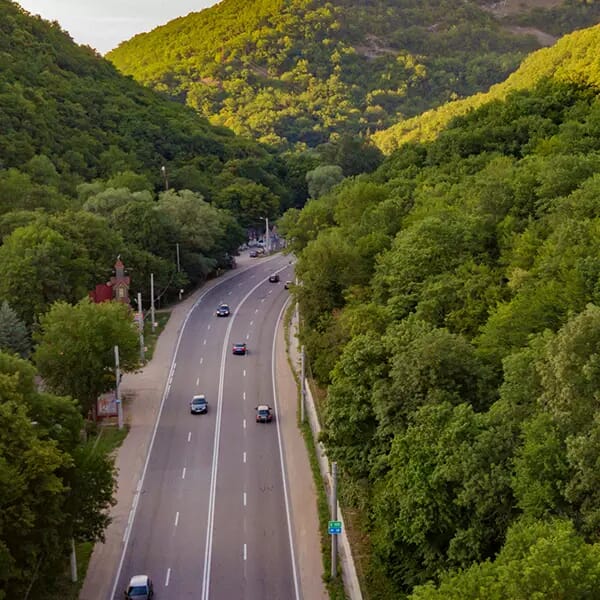 Crédito: Jair Pires / Metrô São Paulo
Crédito: Jair Pires / Metrô São PauloFacial recognition gains space in infrastructure services
The application of this technology in security & mobility, among other services, is already a reality in Latin America.
August 1, 2019Infrastructure
The use of facial recognition applications has dominated the public debate around the world. The highlight came from the controversy triggered by FaceApp, an application that overlays image filters to simulate people’s aging and allegedly had automatic access to the users’ private data, leading to speculation about its use to train face identification algorithms.
Despite the controversy, technologies that predict facial biometrics are already a reality in many sectors of the economy in Latin America, including in the public sphere – especially in the security and urban mobility segments. Countries such as Brazil and Argentina have public entities using the system to improve the provision of services and to fight crime.
One of the initiatives is headed by Companhia do Metropolitano de São Paulo (SP Metrô, the São Paulo subway system), which, on June 28, launched a bidding notice for the implementation of a new electronic image monitoring system. The idea is to serve three subway lines - 1-Blue, 2-Green, and 3-Red.
According to an official announcement, the new system will be fully digital and aims to improve and expand the system’s operating safety with the increase of the camera park. The proposal submission date is August 20.
In July, the Federal Administration for Public Revenue (AFIP), the country’s customs control agency, announced a similar action. The facial biometrics system was installed at the Ministro Pistarini International Airport, better known as Ezeiza.
About to hold regional elections, on October 27, Colombia is also the scene of discussions on the use of the same technology. Historically one of the nation’s most violent cities, Cali can benefit from face-recognition cameras. Candidates for the city hall propose the public policy to combat crime and insecurity.
“The more cameras there are, the more attentive those making the analysis need to be, so we invest heavily in technology. Now, by means of smart processing, a computer will identify individuals, vehicles or situations that may create risks for the people of Bahia much faster and provide this information to the police quickly,” said Governor Rui Costa during the launch of the program.
Use in security is just one of several possible alternatives. Business areas are also already using the innovation to ensure faster service provision to customers, for example.
FullFace, recognized on the market for its partnership with Gol Linhas Aéreas, is a startup dedicated to this market segment. In a GRI Club event, the company detailed how its device works. The technology the company developed allows personal identification through bone structure, disregarding any point on the surface of the face, such as accessories or changes, thus guaranteeing process accuracy.

The main themes for developing the infrastructure industry, such as the use of technologies to improve public services, are topics of Infra Brazil GRI 2019. The GRI Club Infra conference is scheduled for October and will be attended by leaders of companies operating in this industry and representatives of the federal, state, and municipal administrations. Find out how to participate.
Despite the controversy, technologies that predict facial biometrics are already a reality in many sectors of the economy in Latin America, including in the public sphere – especially in the security and urban mobility segments. Countries such as Brazil and Argentina have public entities using the system to improve the provision of services and to fight crime.
One of the initiatives is headed by Companhia do Metropolitano de São Paulo (SP Metrô, the São Paulo subway system), which, on June 28, launched a bidding notice for the implementation of a new electronic image monitoring system. The idea is to serve three subway lines - 1-Blue, 2-Green, and 3-Red.
According to an official announcement, the new system will be fully digital and aims to improve and expand the system’s operating safety with the increase of the camera park. The proposal submission date is August 20.
Initiatives in Argentina and Colombia
A similar application was introduced in the Argentine capital city, Buenos Aires, by the head of government, Horacio Rodríguez Larreta, with a focus on public safety. The technology enables locating and arresting fugitives by means of face detection. The local government says three hundred cameras were installed on streets and subway stations.In July, the Federal Administration for Public Revenue (AFIP), the country’s customs control agency, announced a similar action. The facial biometrics system was installed at the Ministro Pistarini International Airport, better known as Ezeiza.
About to hold regional elections, on October 27, Colombia is also the scene of discussions on the use of the same technology. Historically one of the nation’s most violent cities, Cali can benefit from face-recognition cameras. Candidates for the city hall propose the public policy to combat crime and insecurity.
Success case in Bahia
In Bahia (northeastern Brazilian state), the system – which was implemented in the state capital, Salvador, last December, and was expected to be expanded to the entire state in 2019 – is considered a success. “The Department of Public Security of Bahia (SSP-BA) facial recognition system reached, on the night of July 25, the mark of 42 criminals caught and arrested by way of the technological tool,” says a statement the government agency issued.“The more cameras there are, the more attentive those making the analysis need to be, so we invest heavily in technology. Now, by means of smart processing, a computer will identify individuals, vehicles or situations that may create risks for the people of Bahia much faster and provide this information to the police quickly,” said Governor Rui Costa during the launch of the program.
Application in business
In the case of SSP-BA, the adopted system showed a 98% similarity – between individuals who were being looked for and identified –, which triggered an alarm to the teams closest to the location. Military police units then made the arrests. “It is a technology that is here to stay, and it allows us to increase productivity, further protecting society,” said Mauricio Teles Barbosa, the State’s Public Security Secretary.Use in security is just one of several possible alternatives. Business areas are also already using the innovation to ensure faster service provision to customers, for example.
FullFace, recognized on the market for its partnership with Gol Linhas Aéreas, is a startup dedicated to this market segment. In a GRI Club event, the company detailed how its device works. The technology the company developed allows personal identification through bone structure, disregarding any point on the surface of the face, such as accessories or changes, thus guaranteeing process accuracy.
Infra Brazil GRI 2019

The main themes for developing the infrastructure industry, such as the use of technologies to improve public services, are topics of Infra Brazil GRI 2019. The GRI Club Infra conference is scheduled for October and will be attended by leaders of companies operating in this industry and representatives of the federal, state, and municipal administrations. Find out how to participate.



